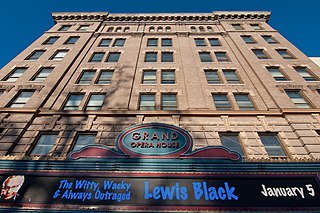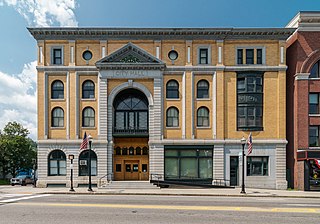
A music venue is any location used for a concert or musical performance. Music venues range in size and location, from a small coffeehouse for folk music shows, an outdoor bandshell or bandstand or a concert hall to an indoor sports stadium. Typically, different types of venues host different genres of music. Opera houses, bandshells, and concert halls host classical music performances, whereas public houses ("pubs"), nightclubs, and discothèques offer music in contemporary genres, such as rock, dance, country, and pop.

The Victoria Theatre and Concert Hall is a performing arts centre in the Central Area of Singapore, situated along Empress Place. It is a complex of two buildings and a clock tower joined together by a common corridor; the oldest part of the building was first built in 1862, and the complex was completed in 1909. The complex has undergone a number of renovations and refurbishment, mostly recently in 2010 when the complex was closed for a four-year renovation project. It reopened on 15 July 2014.

The Newberry Opera House, located in Newberry, South Carolina, is a fully restored historic building that is a live-performance space for popular artists, touring theatre companies, and local organizations. It is listed on the National Register of Historic Places in 1969.

The Grand Opera House is an opera house located at the corner of 8th and Iowa Streets in Dubuque, Iowa that was built in 1890. It was listed on the National Register of Historic Places in 2002.

The Grand Opera House, often called The Grand and originally known as the Academy of Music, is a historic opera house located in Macon, Georgia, United States. Listed on the National Register of Historic Places in 1970, it is now the performing arts center of Mercer University.

The Lensic Theater, located at 211 West San Francisco Street in Santa Fe, New Mexico, is an 821-seat theater designed by Boller Brothers of Kansas City, well-known movie-theater and vaudeville-house architects who designed almost one hundred theaters throughout the West and mid-West, including the KiMo Theater in Albuquerque. The pseudo-Moorish, Spanish Renaissance Lensic was built by Nathan Salmon and E. John Greer and opened on 24 June 1931. Its name derives from the initials of Greer's six grandchildren.
The Broward Center for the Performing Arts is a large multi-venue performing arts center located in downtown Fort Lauderdale, Florida, United States.

The Orpheum Theatre, a 2,308-seat venue listed on the National Register of Historic Places, is located in downtown Memphis, Tennessee, on the southwest corner of the intersection of South Main and Beale streets. The Orpheum, along with the Halloran Centre for Performing Arts & Education, compose the Orpheum Theatre Group, a community-supported nonprofit corporation that operates and maintains the venues and presents education programs.

The Somerville Theatre is an independent movie theater and concert venue in the Davis Square neighborhood of Somerville, Massachusetts, United States. Over one hundred years old, the Somerville Theatre started off as a vaudeville house and movie theater. The theater has since transitioned and now operates as a live music venue and first-run movie theater. As a music venue, the theater has played host to many historic concerts, including the first of the two Last Dispatch concerts, two shows by Bruce Springsteen in 2003, and a performance by U2 in 2009. Recent live performances have included Ryan Adams & the Cardinals, Cursive, Norah Jones, The Jonas Brothers, Joan Baez, and the John Butler Trio.

The Victoria Theatre is a historic 1,154-seat performing arts venue located in downtown Dayton, Ohio. The Victoria hosts a variety of events including theatre, music, dance, film, and comedy.

The Saenger Theatre is a historic theater and contributing building to the Lower Dauphin Street Historic District in Mobile, Alabama. It was dedicated in January 1927. The Saenger Theatre is a Mobile landmark, known for its architecture and ties to local cultural history. The theater has been completely renovated in recent years with an upgraded electrical system, VIP facilities, new stage rigging and sound system. It is the official home of the Mobile Symphony Orchestra and also serves as the venue for movie festivals, concerts, lectures and special events.

Miller Symphony Hall is a 1,100-seat performing arts facility in Allentown, Pennsylvania that hosts the Allentown Symphony Orchestra. The hall was previously known as Central Market (1896), Lyric Theater (1899), and Allentown Symphony Hall (1959). In 2012, it was renamed for the Miller family, longtime owners of the hall and of The Morning Call newspaper.

The Orpheum Theatre is a historic theater in downtown Wichita, Kansas, United States. It was designed by renowned theatre architect John Eberson with funding from a group of local investors and opened on September 4, 1922.

The Fox Theater is located in Stevens Point, Wisconsin. It was added to the National Register of Historic Places in 1982 for its architectural significance.

The McHaffey Opera House is a historic building located in Eldon, Iowa, United States. It was constructed in 1891 and in use by the community through the 1940s. The building was mainly unused for many decades until a volunteer community group bought the opera house in 1995 and began restoration efforts. The McHaffey Opera House was placed on the National Register of Historic Places in November, 1995.

The Tivoli Theatre, also known as the Tivoli and the "Jewel of the South", is a historic theatre in Chattanooga, Tennessee, that opened on March 19, 1921. Built between 1919 and 1921 at a cost of $750,000, designed by famed Chicago-based architectural firm Rapp and Rapp and well-known Chattanooga architect Reuben H. Hunt, and constructed by the John Parks Company, the theatre was one of the first air-conditioned public buildings in the United States. The theatre was named Tivoli after Tivoli, Italy, has cream tiles and beige terra-cotta bricks, has a large red, black, and white marquee with 1,000 chaser lights, and has a large black neon sign that displays TIVOLI with still more chaser lights.

The Staatstheater Mainz is a theatre in Mainz, Germany, which is owned and operated by the state of Rhineland-Palatinate. Situated on the Gutenbergplatz, the complex comprises two theatres which are connected by an underground passage and also by skywalk. Performances of opera, drama and ballet are presented. Its name was Stadttheater Mainz until 1989.
Norfolk Municipal Auditorium was a 5,200 seat multi-purpose arena and music venue in Norfolk, Virginia, USA that opened in May 1943. The arena was constructed after the City of Norfolk and the military found a need to construct an entertainment venue in the city after the population of the city doubled between 1938 and 1941 as a result of World War II-related military buildup.

Barre City Hall and Opera House is a historic government building at 6 North Main Street in downtown Barre, Vermont. Built in 1899, it houses the city offices, and its upper floors have served for much of the time since its construction as a performing arts venue. The building was listed on the National Register of Historic Places in 1973.

Daily's Place is an amphitheater in Downtown Jacksonville, Florida. The venue is connected to the south end of EverBank Stadium and shares space with a "flex field" indoor practice facility for the Jacksonville Jaguars. It opened in May 2017 and seats 5,500 spectators. Since 2019, the amphitheater has become nationally known as the home venue for the U.S. professional wrestling promotion All Elite Wrestling (AEW).



















